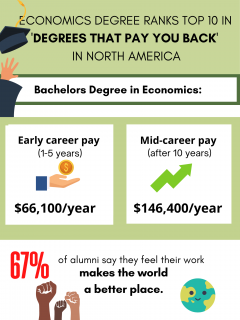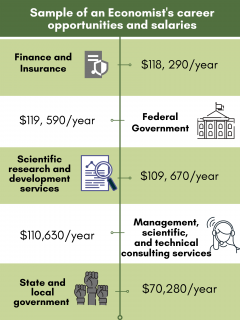Why Study Economics?
Considering applying? Click here to find out how!
Hear about the B.ECON program from Professor Hashmat Khan, former Chair of the Department of Economics:
{Video Production by: Jeff Poissant, FPA}
Economics is relevant to almost every aspect of our lives. At its core, it is the study of decision-making in the face of scarce resources and competing interests. The need to make these prudent choices pervades our day-to-day lives – as individuals, as a community, and as a society.
Economics provides causal insights into important social issues such as health care, protecting the environment, reducing inequality, and the design of social programs and tax systems. Further, technical knowledge gained through the study of economics is portable and highly valued by employers in many areas including: the banking and financial sectors, development, labour relations, international trade, entrepreneurship, and corporate and climate finance. It can also provide a unique leadership edge in your career.
While education in economics is relevant for business or management, its scope and rigour are much broader. Economics is a social science; as an intellectual discipline, economics seeks to measure, analyze, and understand a wide range of social phenomena using a rich set of technical tools and methods.
The focus of an education in economics is on intellectual growth and development. It fosters critical thinking which is one of the most valued skills for Canadian employers[1]. This is also reflected in higher salaries and wages for economists in the job market relative to many other disciplines.
The Department offers a variety of undergraduate programs. An overview of each is provided under the first seven sub-headings of this section of our Web site. A general overview of undergraduate economics at Carleton is provided in our recruitment brochure found here.
Undergraduate program advising and course queries: |
Sean Hall, Undergraduate Administrator |
| Professor Radovan Vadovič, Undergraduate Supervisor |
The Department also offers an eight-month program of study providing excellent core economics and econometrics training as well as a Post-Baccalaureate Diploma (PBD) that is essentially equivalent to the final year of our standard Honours program.
Student Quote: Frohan Foroutan

One of the best things about studying Economics at Carleton is that the professors have so many contacts in the field. The department hosts events throughout the year featuring world-class guest lecturers talking about current economics issues. They help connect real world situations to the theories learned in class.
Carleton’s Capital Advantage
Carleton’s location in the nation’s capital, Ottawa, gives you unique access to a wide range of resources in the public service. You will benefit from a wealth of research facilities and libraries in the city as well as the departments and agencies of the federal government, including: Agriculture and Agri-Food Canada, Bank of Canada, Competition Bureau, Environment Canada, Finance Canada (Department of Finance), Foreign Affairs, Trade and Development Canada, Health Canada, and Industry Canada.
Learn more about our Capital Advantage
Aggregate data on the career paths of many of our graduates can be found on the “Career Paths of FPA Bachelor’s Grads” page of the Faculty of Public Affairs (FPA) Web site.
Earnings Now—and Later


1. “Highest Paying Jobs With a Bachelor’s Degree.” American Economic Association, at https://www.aeaweb.org/resources/students/careers/earnings (Accessed March29, 2022).
2. Bureau of Labor Statistics, U.S. Department of Labor, Occupational Outlook Handbook, Economists, at https://www.bls.gov/ooh/life-physical-and-social-science/economists.htm (Accessed March 14, 2022).